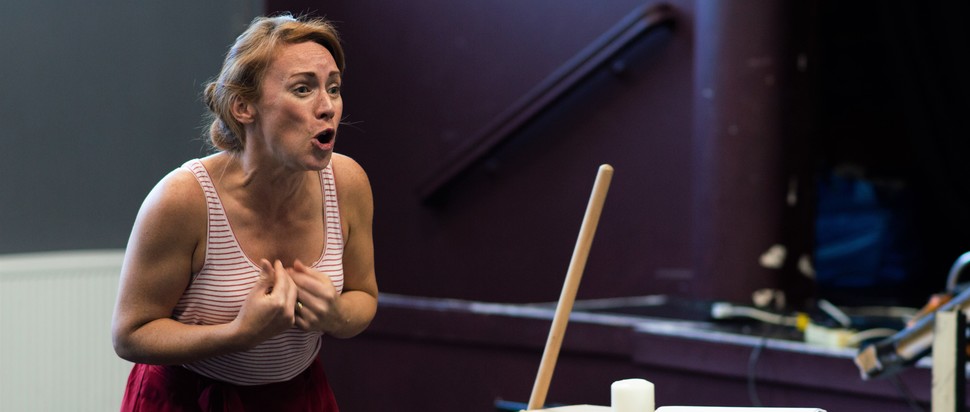Meghan Tyler on Crocodile Fever, 'an angry scream at the world'
The Skinny chats to Meghan Tyler about her play Crocodile Fever, and gets an exclusive invite into the rehearsal room ahead of its world premiere
It was during a stay with her dad in her hometown in Northern Ireland that the writer Meghan Tyler first got the idea for her play, Crocodile Fever. She was watching TV – "you know that particular sort of TV you watch with your parents?" – and Steve Backshall's documentary, Down The River, came on. "This guy was travelling around [the Baliem river in Papua New Guinea], meeting different tribes and talking to people," says Tyler. "He met [members of] the Asmat tribe – and they have a particular myth about crocodiles. They think that crocodiles are the reincarnation of evil human beings." When the crocodiles threaten the community, the customary ritual is to hunt and cook them. The image of the reptile as a bad person whose victims are eventually avenged stuck with Tyler, but "at the same time," she says, "I had dialogue in my head about sisters set in my hometown... and those two ideas somehow just came together."
The result was Crocodile Fever – a black comedy set in Northern Ireland in 1989, about two sisters, Alanna and Fianna, and their abusive father (the 'crocodile' of the title). The show, commissioned by the Traverse Theatre to appear as part of its Festival programme this year, is more broadly about "abuse, overcoming abuse, feminism, #MeToo, Northern Ireland, the Catholic Church and the British Army". We were lucky enough to be invited into the production room during the third week of rehearsals, to have a chat with Tyler and catch a glimpse of the show ahead of its world premiere on 2 August.
Tyler feels that the show's era and setting is "the perfect metaphor" for the family dynamic at play in Crocodile Fever. Northern Ireland in 1989 was "a pressure cooker," she says, and the atmosphere of the play itself "is quite oppressive"; it's muggy, a storm is about to break, and the characters – from what we can guess from the poster design of the two wielding chainsaws – are on the brink of some serious, soul-unleashing rage. "There were three prongs of oppression in Northern Ireland in the late 80s," she tells me. "The oppression by the Catholic Church; the oppression by the British Army; and the oppression by men in the family home."
These strands clearly intersect and overlap in Crocodile Fever. The wall of the rehearsal room is covered with pictures of 80s, largely pink decor, alongside photos of Belfast blasted by gun-carrying British soldiers and IRA propaganda; in the scene we see rehearsed, Lisa Dwyer Hogg's Fianna taunts Lucianne McEvoy's highly-strung Alannah for wearing her hair like 'a nun'. Normative ideals of femininity, political and religious dictations and the reign of the family patriarch are all interchangeable constraints here, all part of the same world. Alannah and Fianna may be "polar-opposites" at the start of the play – one a house-bound, devout Catholic, the other an IRA rebel – but their shared experience of oppression draws them together, creating "very similar internal motors" that express rage and trauma in "different ways."
Why should audiences see a play about 1980s Northern Ireland now? "It's such a scream – and an angry one – at a world that is… well, so bloody shit," laughs Tyler. "It's a really dark comedy, and there are so many laughs in it. I love giving an audience a good night out at the theatre, but I also want an audience to leave absolutely pumped – like how you feel the end of Thelma and Louise, when they drive off the cliff and you go: 'Yes, girls!'. That feeling of being uplifted and feisty again – that's my intention with this piece.”
Crocodile Fever, Traverse Theatre (Traverse 1), 2-25 Aug (not 5, 12, 19), various times, £9-22
